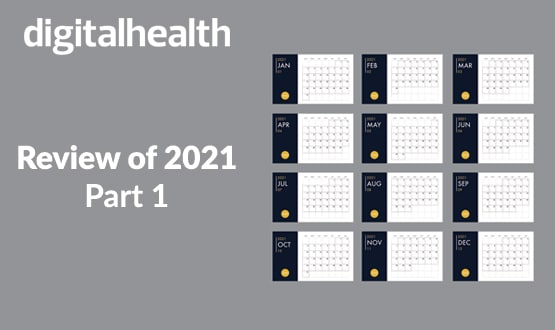Poll: Should there be more clinicians on Hancock’s Healthtech Advisory Board?
- 23 November 2018

Following the first meeting of Matt Hancock’s Healthtech Advisory Board, Digital Health News wants to know your thoughts on its membership.
According to the Department for Health and Social Care, the board is intended to “help guide the government on its mission to overhaul technology and IT in health and social care”.
The secretary of state for health and social care posted a picture of its membership earlier this week following its initial meeting.
NEWS: Here’s our new Healthtech Advisory Board, bringing together the best minds to help drive our mission to transform tech in the NHShttps://t.co/V4U8o66ixj pic.twitter.com/p5PdqHaheh
— Matt Hancock (@MattHancock) November 19, 2018
But some Digital Health News readers, along with commentators on social media, have criticised the lack of practising clinicians on the board.
So we want your views: should there be more of a clinical presence on Hancock’s advisory board? You can vote below and we will reveal the results next week.
Matt Hancock’s Healthtech Advisory Board is chaired by Ben Goldacre, who is joined by:
- Manoj Badale – Co-Founder of Blenheim Chalcot, a digital venture builder
- Nicola Blackwood – Chair of the Human Tissue Authority
- Michelle Brennan – Company group chair for Johnson & Johnson Medical Devices Companies
- Rachel Dunscombe – Chief executive of the NHS Digital Academy and director of digital for Salford Royal NHS Group
- David Gann – Professor of Innovation and Technology Management at Imperial College London
- Nicole Junkermann – Founder of NJF Holdings, an international finance and investment company
- Parker Moss – Health technology entrepreneur in residence at F-Prime and Eight Roads
- Daniel Korski – Co-founder and chief executive of PUBLIC, a venture capital firm
- Dan Sheldon – Head of digital at Well Pharmacy
- Jeni Tennison – Chief executive of the Open Data Institute
- Roger Taylor – Chair of Centre for Data Ethics and Innovation
- Sir Mark Walport – Chief executive of UK Research and Innovation (UKRI)




24 Comments
The panel misses connecting up the high level strategy ambitions with ground level action – and the relevant stakeholders for this part of the conversation has to be clinicians who have experience of delivering change
If you don’t understand the front line challenges of delivering IT (clinical, operational and technical) then any solution are likely to fail. Dare I mention NPfIT!
An eclectic mix, and aside from star CIO Rachel Dunscombe, I am not sure they are likely to relate to the many challenges that have held use of technology in the NHS back. Two venture capitalists, when Derek Wanless identified in 2002 that chronic underspend was the prime issue. NPfIT put most of the funds to suppliers, left us with almost nothing. There’s a danger this will too. I’d like to see some more practical clinicians and informaticians in the mix. As in his recent speech, we need sustained revenue funding, not just Apps and opportunities for companies to exploit.
We need people with experience in the trenches of digital health health IT – Clinicians, Technicians, and vendors (including start-up)
We also need patients and careers who have experienced the failings of current digital tech.
But it’s those people who have delivered and have allowed the mediocrity that exists today. Clean brush, fresh minds. Looks good to me
And why do we have to think of patients as some special sub group, I will put money that on that list above there will be at least 3 people who receive long term chronic treatment, and the rest have some contact in last year, you know as patients…..
Eh – if you need to ask, you just don’t get it.
Ewan specifically referred to “patients and carers who have experienced the failings of current digital tech”. These aren’t just IT professionals or Informaticians with a passing knowledge as “patients”.
As a cancer patient advocate I come into regular contact with people in this particular group. The NHS is fragmented and all too often health care simply isn’t joined up. There are literally thousands of preventable deaths each year because of such failings. One of the many reasons why our cancer survival rates are so far behind the EU average.
I am lucky, my Oncologist and my GP both have access to the same local radiology and pathology services of the local NHS Trust and can therefore both see my scan and test results. Neither can see my detailed patient record held by the other, but at least those fragments of my care are joined up. Other cancer patients aren’t so lucky and rely on snail mail or fax to transfer urgent and important diagnostic information from Acute to Primary Care.
I’m all for getting innovative digital solutions in place and for moving care up to the next quatum level, but we shouldn’t make any assumptions about the basics of joined up health care being in place across the health care system. It simply isn’t – we currently have islands of excellence in a sea of mediocrity and that just isn’t good enough!
I’m not asking Ewan, but how do you know none of these people face the same challenges?
I agree with Ewen – By the way Eh- your comments are nonsense based upon the fact that Start ups put their heart soul and sometimes homes on the line to make a positive change. The range of individuals above are hardly Clean fresh minds. They have been for a while roaming the corridors of power at the DoH and some of them have hardly any health expertise – i.e Daniel Korski
That may be – But your comment makes no sense with regards to the others which say it should be doctors and nurses! Or do you mean only start ups from ex clicnians?
Eh – i think you are wrong in your diagnosis of why it didn’t work before – and my view is backed up by the literature – not having clinicians etc engaged in delivery was the reason for the failure – this is a change management process not a tech excercixe per se
I agree we are all patient’s and careers In the last year I have had a granddaughter with meningitis, an elderly mother develop dementia after a fall and a broken hip and a hip replacement myself. What I’ve seen is islands of excellence, not helped and often hindered by their IT and certainly not joined up across the care pathway.
It’s really hard to get the ordinary patient view – Many who put themselves forward as patient representatives are narrowly focussed on a particular condition, important to them or people who have actually had significant professional engagement in health and care in their careers. However, this doesn’t mean we should not try.
Eh – It’s neither fair our accurate to say “….those people who have delivered and have allowed the mediocrity that exists today” Those responsible for the current mediocrity are politicians, big companies and leaders parachuted in from outside. Who don’t understand the complexity of health and care data and workflows.
Politicians are always looking for white knights firing silver bullets and have a touching faith in the tooth fairy.
This is hard. We need constancy of purpose and an open approach involving those with real experience in the trenches who have indeed “cursed through sludge”
The guy who wrote the books Bad Science and Bad Pharma sounds like an ideal counter balance to the Big Pharma members of the group 🙂
Ideally I’d have liked to have seen more patient advocates and jobbing clinicans on there, but these can always be co-opted once the group has been established.
I agree at least 2 influential clinicians are needed; however never mind nurses and doctors the end game is patient care so where are the patients? All too often medical technology designs a wonder invention that is useless for patients. Innovation and digital technology is to allow more access for Patients to see their records that actually belong to them! More transparency and more choices in their care. Personally I think the whole panel needs a rethink!
Totally agreed
It does seem short-sighted not to involve a significant proportion with frontline experience who probably have seen IT when it is least effective. Good information and intelligence only comes from accurate and complete data captured by frontline staff who are engaged in and consulted on the solutions they use. So getting the balance right in the team seems to be essential for it to be effective.
Here is a really simple test – How many of these have actually spent time with a patients and re-designed clinical services – i.e. some service improvement ? If not ask them to step down. Also what the hell are venture capitalists going to teach the NHS ?
People do realise that Ben Goldacre is a clinician? I can’t be bothered to look up history for rest.
Who will be using this technology most?
Nurses.
Put them on the board. You won’t regret it!
Nurses who have recent practice experience or better still current clinical roles.
That will be of no avail unless there is a big majority of clinicians on the board, to ensure that clinical use of the technology is not just camouflage for non consensual harvesting of patient level data for secondary use, and for sale, in total disregard of the express objections of the data subjects, and in contravention of data protection law. Preferably take Matt Hancock off the board and put him somewhere safe – that is, safe from doing more harm than he has done already. Behind bars would be ideal, for a long stretch.
Clinician and technology are like oil and water so difficult road ahead!
What we need is a Secretary of State (and a Government) who are interested in improving healthcare. The Government’s agenda, and Hancock’s, is something completely different, namely, downgrading or removing healthcare offered by the NHS to the point where a lot of people will either have to pay for private healthcare, or will choose to pay for private healthcare. Anyone not in a position to do that will just have to take what they are given. All of that is enabling healthcare funding to be diverted into harvesting and using health data to stimulate the digital economy. The entire agenda of the advisory board is an outrage. We don’t need clinicians to solve technology issues so much as to change the agenda. What patients need, instead of digital games to keep them amused, is an advisory board on confidentiality and transparency, with a membership comprising people who, unlike the so called “National Data Guardian”, are not colluding with the Government’s pervasive duplicity and bullying and colluding with their agenda of pillaging patient data to drive the digital economy and make Britain a world leader. We have lost the Empire. Let’s build another one and get rich in the process.
Yes he is… but he has spent little if any time in clinical practice. He hasn’t overseen system implementations or spent much time in real life doing this kind of thing. What we really need on this panel is some clinicians from all sectors – GP, acute etc – who actually know what they are talking about. This lot are all a million miles away from the front line and I would really question what this panel will continue.
Yes Joanna, nurses on board, but only re the front end which is what they see and perhaps communications processes they find don’t work (like most in the NHS). I see no reason why there should not be a virtual team too, calling in people who have relevant insights on a particular topic. This will stop the team becoming a horde with all the suggestions for members.
Comments are closed.